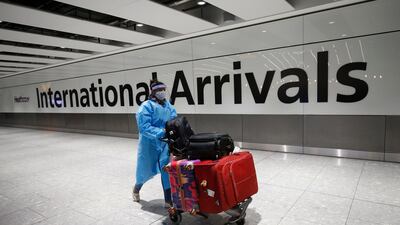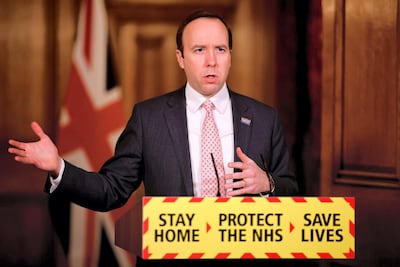Restart the economy by keeping tough border controls or resume international travel and keep the UK under lockdown to guard against new variants …
That is the tough choice facing ministers as pressure grows within the governing Conservative Party to chart a course out of lockdown as coronavirus cases continue to fall.
While some MPs want restrictions to be loosened, others such as former health secretary Jeremy Hunt are pushing the government in yet another direction, calling for measures to remain in place until cases drop below 1,200 a day.
Tuesday’s coronavirus figures of 12,364 cases and 1,052 more deaths show the UK has a long way to go to achieve that aim.
But the country is heading in the right direction after a harrowing few weeks in which the death toll climbed above 100,000.
While ministers say the toll is still too high, new figures suggest the second wave hit a peak in the third week of January.
Office for National Statistics data shows a total of 1,404 deaths involving Covid-19 were reported on January 19.
The daily death toll in the UK has not been above 1,300 since.
Ministers are pledging to strengthen Britain’s security controls to keep out mutant strains of coronavirus.
From Monday, international travellers arriving in the UK face heavy fines and a 10-year prison sentence if they give false information about the countries they have visited.
The government also announced a new Covid testing regime, with all international passengers required to test negative 72 hours before departure, as well as on day two and eight of their 10-day quarantine period after arrival.
'When will this policy end, if ever?'
These measures add to the requirement for travellers from 33 "red list" countries, including the UAE, to be isolated for 10 days in an approved hotel.
Health Secretary Matt Hancock said border restrictions were vital if the UK wanted to emerge from lockdown.
“At this crucial point, strong protections at the border are part of defending and safely allowing the domestic opening up,” Mr Hancock said.
“Ensuring that we have protection from variants that might arise from overseas is an important part of the plan, until we can get to a position where we can be confident in vaccine efficacy against all variants, not just against the current variants here in the UK.”
Mr Hunt supported the measures and called for ministers to make lowering the daily case rate a “central priority”.
He said a low infection rate would allow officials to introduce “enhanced contact tracing for all new cases”.
Other Conservatives suggested coronavirus restrictions should only be in place to prevent hospitals from becoming overwhelmed.
“When is this policy going to end, if ever?” asked former minister Mark Harper, chairman of the Covid Recovery Group of MPs who want lockdown measures lifted.
“Because if the virus continues to mutate, surely the risk is going to be there forever, and so when can it be removed?”
Sir Desmond Swaine, Conservative MP for New Forest West, urged the government to “eschew the voices calling for a desired level of infection within the community”.
“If we depart from a level of hospitalisation with which the NHS can cope effectively, we will lose the proper sense of urgency to lift restrictions that are so devastating and costly to us all,” Mr Swaine said.
Mr Hancock said travel measures could stay until the government was sure that vaccines worked against new variants of the coronavirus, or booster shots have been given this year.
He said that more information was needed on the success of the vaccines.
"And if that isn't forthcoming, we will need to vaccinate with a further booster jab in the autumn, on which we are working with the vaccine industry," Mr Hancock said.
"These are the uncertainties within which we are operating."
Paul Charles, chief executive of travel consultancy the PC Agency, called for an exit strategy.
“Adding layers of complexity won’t help the economy to recover,” Mr Charles said.
On Monday, the UK’s National Institute of Economic and Social Research dashed hopes of a “V-shaped” economic recovery when it downgraded its forecast for growth this year from 5.9 to 3.4 per cent.
Despite the worsening outlook for public finances, Labour has also called on Chancellor of the Exchequer Rishi Sunak to extend the government’ssupport for hard-pressed companies by extending the furlough scheme.
In a rare piece of good news for the government, the steady delivery of vaccines has put it on course to hit its goal of offering a vaccine to the top four priority groups by mid-February.
This has turned attention to who should be given a dose when the over-50s have been inoculated.
Key workers could be given vaccine priority
Prof Adam Finn, a member of the government’s Joint Committee on Vaccination and Immunisation, said priority would be a choice based on “who society values most” as the economy reopens.
There have been calls for teachers and emergency service workers to be moved up the list.
“It goes beyond just medicine and public health as to who society values most and who they think are most important,” Prof Finn told the BBC.
Meanwhile, Oxford Vaccine Group chief investigator Prof Andrew Pollard said “the jury is still out” on whether the world would need new vaccines to fight mutant strains.
Prof Pollard said a recent study showing low efficacy of the Oxford-AstraZeneca shot among young people indicated that the virus could be in circulation for a long time, even if vaccines mitigated the more harmful health effects of Covid-19.
“It’s telling us about the future of this virus," he said. "It will still find ways of transmitting and causing mild infection, such as colds.
"There are definitely new questions about variants that we're going to be addressing. And one of those is: do we need new vaccines?
"I think the jury is out on that at the moment but all developers are preparing new vaccines, so if we do need them we'll have them available to be able to protect people.”
In pictures - coronavirus in the UK
















